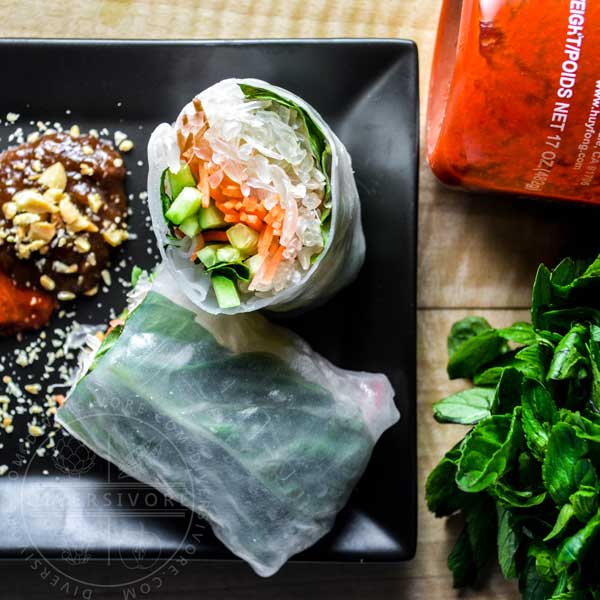How to Find, Choose, & Use
Pomelo
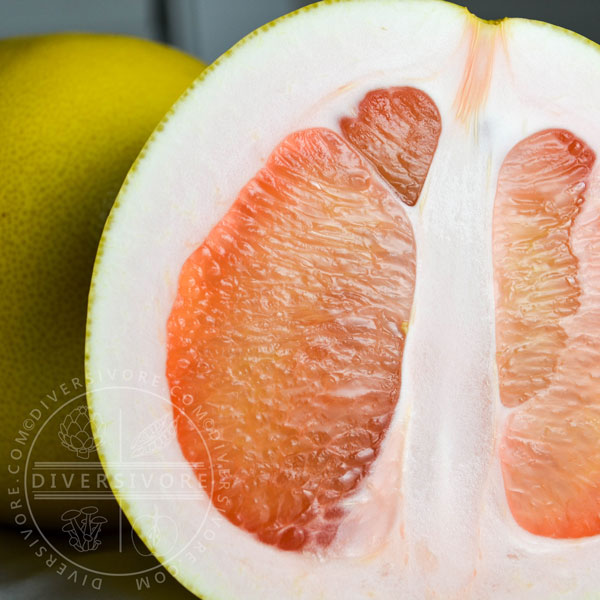
Share this Guide
The Basics
What Is It?
The large, sweet, thick-skinned fruit a species of citrus (family Rutaceae). Pomelos have been crossed to produce numerous citrus hybrids, most notably grapefruit.
Seasonality
WINTER
Flavour Profile
Sweet/Sour/Bitter, acidic (juice), highly fragrant
Other Names
Latin: Citrus grandis
English: Pommelo, Pummelo, Shaddock, Shaddick, Pamplemousse (not to be confused with grapefruit).
Chinese - 柚子 - yòuzi (Mandarin), 碌柚 - luk jau (Cantonese)
Japanese - ブンタン - buntan
Pomelo FAQs
How Do You Eat a Pomelo?
This skin and pith of a pomelo is very thick, but there's not much trick to eating one. Simply peel the outside off (a knife helps get things started) to reach the grapefruit-like center. Like any citrus, the individual segments are surrounded by a membrane, though this is quite thick and tough in most pomelos. Luckily, it can be peeled off fairly easily to reach the soft fruit inside.
Is Pomelo Sweet or Sour?
Ideally, a bit of both. The flavour should be similar to a good grapefruit in that respect, though pomelos are generally a bit less bitter. Note that quality can vary quite a bit, and some fruits are likely to be sweeter than others.
Is A Pomelo a Grapefruit?
No, but they are related. Grapefruits are the hybrid offspring of a pomelo and a sweet orange.
Are Pomelos Hybrids?
No - in their original form, pomelos are one of the few truly wild citrus fruits (i.e. not the result of crossing various citrus types). That being said, some commercial pomelo cultivars may have varying degrees of hybrid genetics.
How-To
Find
Asian Grocery Stores, Conventional Grocery Stores, Fruit Markets
Choose
Fruits that feel heavy/dense for their size, with an unblemished and fragrant peel.
Prep
Difficulty: Low to Moderate - The extremely thick rind is fairly easy to peel. The membranes around the fruit segments are too tough to eat and should be peeled, but this too is relatively simple.
Use
Generally eaten raw, though it can be cooked or incorporated into desserts/preserves. The zest can be used like any other citrus. The thick pith can be used (with preparation) as a vegetable.
Store
Ripen: Room Temperature
Short Term: Refrigerate
Culinary Info
Flavour Profile
Sweet/Sour/Bitter; Grapefruit-like with an herbal, bitter character. Sourness can vary a great deal from fruit to fruit and between varieties.
Substitutions
Sweet grapefruit makes a fairly good substitute, though it tends to be much juicier than pomelo. Melogold makes a good replacement, but is generally harder to find than pomelo (see "Substitution Note" below).
Cuisines
Popular in East and Southeast Asia and well suited to those flavour palettes.
Flavour Pairings
Savory: Herbs, bitter greens, raw mild onion, soy-based sauces
Sweet: Cardamom, cinnamon (when used in small quantities)Varieties
Pomelos can be pink-fleshed and white-fleshed, with multiple varieties within each category (see photos and "Important Varieties" note below). Pink pomelos are often juicier and sweeter.
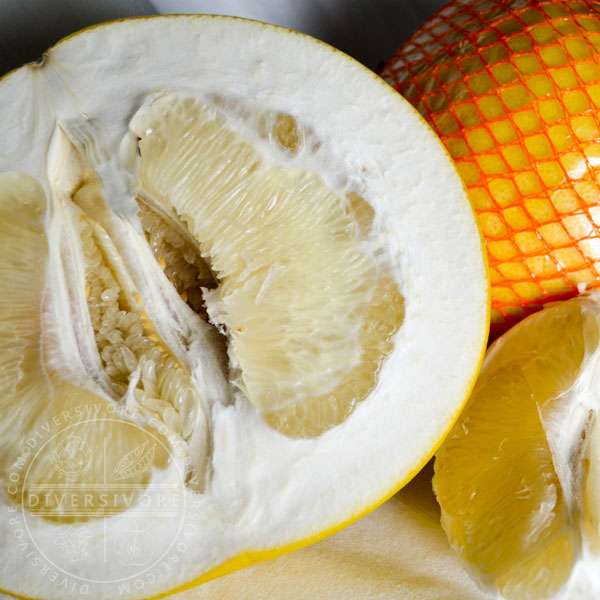
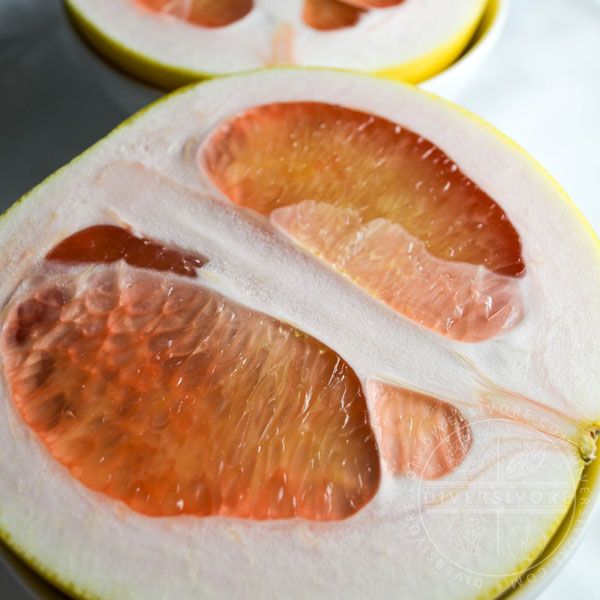
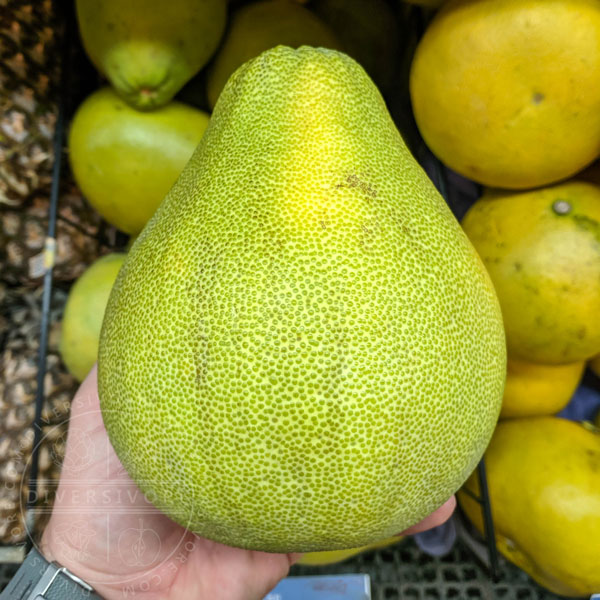
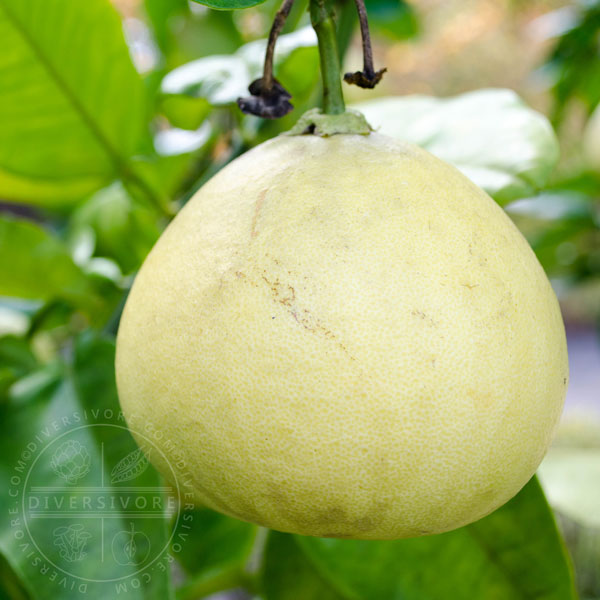
More Info
Nutrition
Exceptionally high in Vitamin C.Nutrition FactsPomelo (Shaddock) - 100 g (3.5 oz)Amount Per ServingCalories 38% Daily Value*Sodium 1mg0%Carbohydrates 9g3%Fiber 1g4%Protein 1g2%Vitamin C 84.2mg102%Calcium 10mg1%Iron 0.2mg1%* Percent Daily Values are based on a 2000 calorie diet.Top-To-Tail
The fruit is entirely edible or usable, including the skin (zest and pith), flesh/juice, and seeds. Membranes separating the segments are technically edible, but are usually too tough. See note below for details.
GMO Status
Non-GMO
Health & Science
As with grapefruit (and many other citrus fruits), pomelos may interact with certain classes of drugs.
Organic vs. Conventional
Both organic and conventionally grown pomelos are available, though availability may be limited.
Share this Guide


